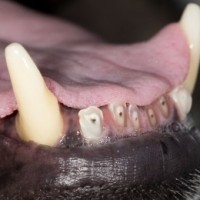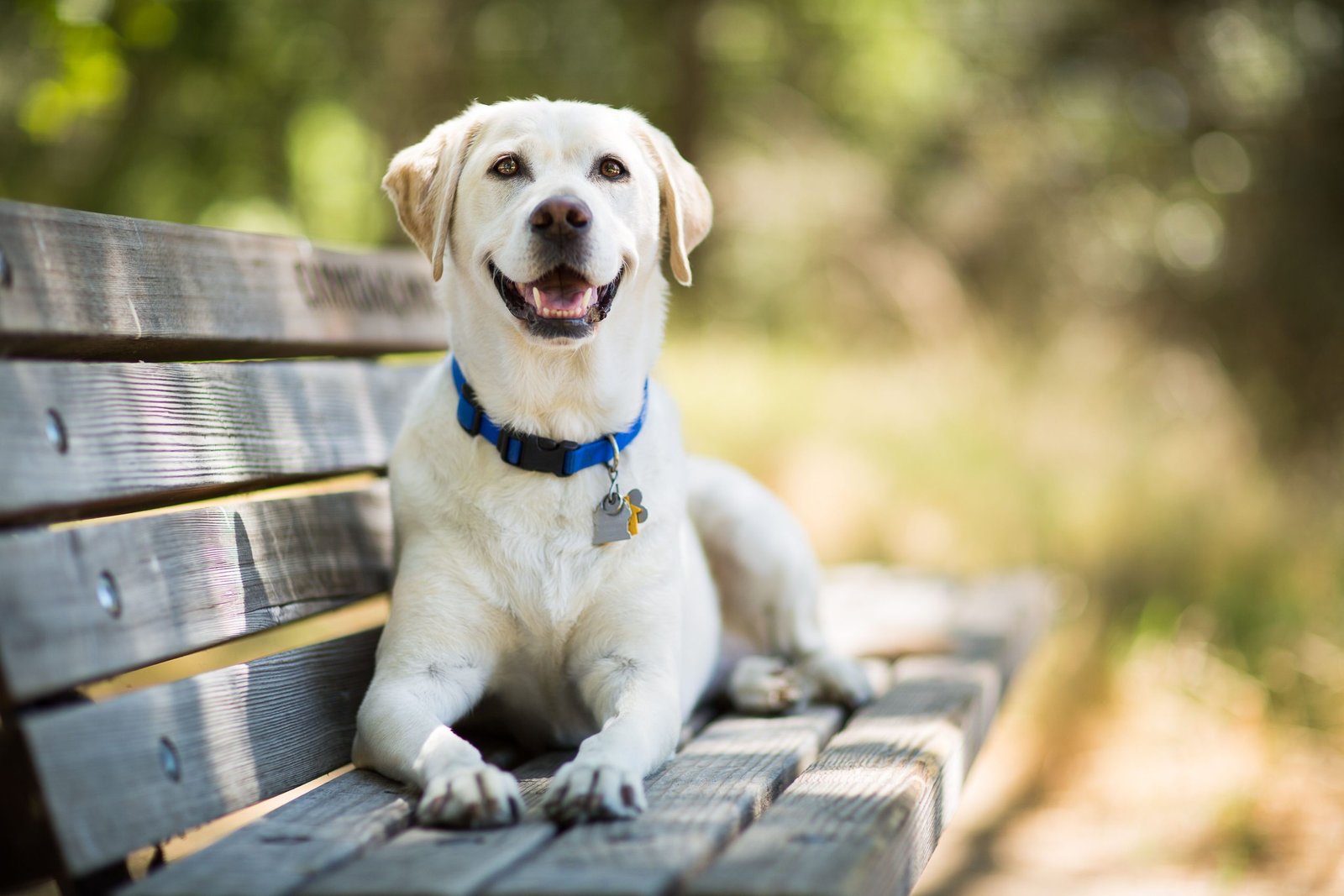If your dog’s teeth are worn down, it is important to seek veterinary treatment to address any underlying issues and prevent further damage.

Credit: unionvet.ca
Causes Of Worn Down Teeth In Dogs
Dogs are known for their love of chewing, whether it’s on appropriate objects like toys or bones, or on inappropriate objects like furniture or rocks. Unfortunately, this chewing behavior can lead to worn down teeth in dogs. There are several common causes of worn down teeth in dogs, including:
Chewing On Inappropriate Objects
One of the most common causes of worn down teeth in dogs is chewing on inappropriate objects. Dogs may chew on furniture, rocks, or even metal wire fences, which can cause significant wear and tear on their teeth. It’s important to provide your dog with appropriate chew toys to redirect their chewing behavior and protect their teeth from further damage.
Malocclusion
Malocclusion, or misalignment of the teeth, can also lead to worn down teeth in dogs. When the teeth are not properly aligned, they may grind against each other, causing excessive wear. Malocclusion can be genetic or caused by injuries to the jaw or mouth. Regular dental check-ups with your veterinarian can help identify and address malocclusion in your dog.
Bruxism
Another potential cause of worn down teeth in dogs is bruxism, which is the medical term for teeth grinding. Bruxism can occur due to stress, anxiety, or dental pain, and can result in worn down enamel and damaged teeth. If you notice signs of bruxism in your dog, such as grinding noises or excessive drooling, it’s important to consult with your veterinarian for a proper diagnosis and treatment plan.
In conclusion, there are several causes of worn down teeth in dogs, including chewing on inappropriate objects, malocclusion, and bruxism. It’s important to address these issues to prevent further damage to your dog’s teeth and ensure their oral health. Regular dental check-ups, providing appropriate chew toys, and managing stress and anxiety can all help keep your dog’s teeth in good condition.

Credit: lbah.com
Signs And Symptoms Of Worn Down Teeth
If your dog’s teeth are worn down, it could be a sign of dental issues. Contact your veterinarian to discuss treatment options such as root canal therapy, extraction, or crown therapy to address the problem and prevent further complications.
Difficulty Eating
If your dog’s teeth are worn down, you may notice that they are having difficulty eating. Chewing food becomes challenging for them, particularly harder textures or larger pieces. They may take longer to eat or have to exert more effort to chew, which can be frustrating and uncomfortable for them. This can also lead to weight loss or poor nutrition if not addressed. If you observe your dog having difficulty eating, it is essential to consult with a veterinarian for a proper evaluation and treatment plan.Excessive Drooling
Excessive drooling is another sign that your dog’s teeth may be worn down. When the teeth are worn, it can affect their ability to close their mouth properly, leading to increased saliva production. You may notice your dog’s mouth constantly drooling, resulting in wet patches on their fur or excessive saliva on their toys or bedding. If your dog is experiencing excessive drooling, it is crucial to have their teeth examined by a veterinarian to determine the underlying cause and provide appropriate treatment.Bad Breath
Bad breath, also known as halitosis, is a common symptom of worn-down teeth. As the teeth wear down, they can develop cracks, crevices, or exposed dentin, which can harbor bacteria and lead to an unpleasant odor. If your dog’s breath suddenly becomes foul, even with regular dental care, it could be an indicator of worn-down teeth. It is essential to have your dog’s teeth checked by a veterinarian to identify any underlying dental issues and develop an appropriate treatment plan. In conclusion, if you notice your dog experiencing difficulty eating, excessive drooling, or bad breath, it is crucial to seek veterinary assistance. These signs and symptoms can indicate that your dog’s teeth are worn down and may require dental treatment. By addressing the issue promptly, you can help ensure your dog’s oral health and overall well-being. Remember to consult with a veterinarian for an accurate diagnosis and personalized treatment options.Treatment Options For Worn Down Teeth
If your dog’s teeth are worn down, it’s essential to explore the various treatment options available. Depending on the severity of the wear, your veterinarian may recommend one of the following treatment methods:
Extraction Therapy
Extraction therapy involves removing the affected or diseased teeth to prevent further damage or infection. This procedure is typically recommended if the tooth is severely worn down and cannot be salvaged through other means.
Root Canal Therapy
Root canal therapy is an alternative treatment for worn down teeth that may still be salvageable. In this procedure, the inner portion of the tooth, including the nerve and pulp, is removed, and the tooth is capped with a crown to restore its function and aesthetics.
Metal Crown Therapy
Metal crown therapy is particularly beneficial for dogs whose worn teeth are a result of chewing on objects that cannot be removed from their surroundings, such as cages, crates, or rocks. A metal crown is placed over the worn tooth to provide protection and restore normal function.
When it comes to treating your dog’s worn down teeth, it’s crucial to consult with your veterinarian to determine the best course of action. They will evaluate the extent of the damage and recommend the most suitable treatment option to improve your dog’s oral health.
Preventing Worn Down Teeth In Dogs
Dogs, just like humans, can experience worn down teeth. This can be caused by factors such as age, chewing on hard objects, or a dental condition. In order to prevent your dog’s teeth from getting worn down, there are a few measures you can take. By implementing these strategies, you can help maintain your dog’s dental health and prevent any potential complications.
Provide Appropriate Chew Toys
One of the most effective ways to prevent your dog’s teeth from getting worn down is by providing them with appropriate chew toys. Opt for durable toys and dental chews that are designed to encourage chewing while being gentle on their teeth. These toys are made from materials that are less likely to cause excessive wear and tear on their teeth. Additionally, they can help satisfy your dog’s natural urge to chew, redirecting their chewing behavior away from inappropriate objects.
Regular Dental Check-ups
Regular dental check-ups are crucial for maintaining your dog’s dental health. During these check-ups, a veterinarian will examine your dog’s teeth and gums, identifying any signs of wear or dental issues. This allows for early detection and intervention, preventing further damage to their teeth. Your veterinarian can also provide professional cleaning to remove any tartar or plaque buildup that may contribute to the wearing down of teeth.
Monitor Dental Health
Being vigilant about your dog’s dental health is key in preventing worn down teeth. Regularly observe their behavior and look out for signs of dental discomfort or abnormal tooth wear. These signs may include excessive drooling, bad breath, difficulty eating, or favoring one side of the mouth while chewing. If you notice any abnormalities, consult with your veterinarian for further evaluation and treatment.
In conclusion, preventing worn down teeth in dogs requires proactive measures such as providing appropriate chew toys, regular dental check-ups, and monitoring their dental health. By taking these steps, you can help ensure your dog’s teeth stay strong and healthy, reducing the risk of dental complications in the future.

Credit: www.petplace.com
Frequently Asked Questions On What To Do If Your Dog’s Teeth Are Worn Down
How Do You Fix A Worn Down Dog’s Teeth?
If your dog’s teeth are worn down, affected or diseased teeth may need treatment such as root canal or extraction therapy. Metal crown therapy may also be beneficial if the offending object cannot be removed from their surroundings. Regular dental checkups with a veterinarian can help monitor and address any issues.
Is It Normal For Dogs Teeth To Wear Down?
Yes, it is normal for dogs’ teeth to wear down as they age due to their chewing habits. To address worn down teeth, affected or diseased teeth may require treatments like root canal or extraction therapy. In some cases, metal crown therapy may be needed if the object causing the wear cannot be removed.
Regular check-ups with a veterinarian can help monitor and address dental issues.
Can Worn Down Teeth Be Repaired?
Yes, worn down teeth can be repaired. Your dentist can use crowns, veneers, or resin bonding to fix the damage, depending on the extent of the wear and your smile goals.
How Do You Fix Teeth That Have Been Worn Down?
To fix teeth that have been worn down, dentists can use treatments such as crowns, dental bonding, or veneers. These treatments help restore the appearance, function, and feel of the teeth. It is best to consult with a dentist to determine the extent of the damage and the most suitable treatment options.
Conclusion
If you notice that your dog’s teeth are worn down, it’s important to take action to prevent further damage and discomfort. Contact your veterinarian to schedule a dental exam and discuss treatment options such as root canal therapy or extraction.
Providing durable toys and dental chews can also help manage natural tooth wear. Remember to continue regular checkups and dental treatment to maintain your dog’s oral health. Take proactive steps now to ensure your furry friend’s teeth stay healthy and strong.

